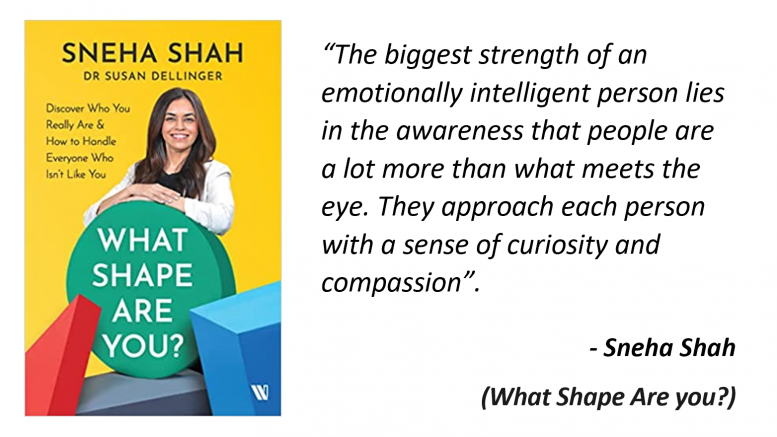Do you ever feel overwhelmed working for a demanding boss with high level of discipline who would take offence if anyone disagreed with him, a seemingly low-profile subordinate who is hardworking but an introvert who finds it difficult to strike up a conversation, and you on the other side enjoy chit-chatting, being friendly with your team, and being interested in each other’s lives? The truth is that none of you are flawed. It is your Shape; it is a personality attribute that is a part of YOU and is neither good nor negative. It’s about how you adapt your personality and innate preferences to the situation.
Sneha Shah is a psychologist and has spent many years learning and understanding the subject of behavioural patterns and emotional issues of clients and also from her own personal life. In the book ‘What Shape Are You’ Sneha has introduced a concept designed by Dr. Susan Dellinger on understanding human psychology. Dr. Dellinger had developed a technique that enabled people to discover personalities and identify communication styles through five geometric shapes. The Idea was to identify and choose a shape that connects with you the most. The system is known as ‘The Psycho-Geometrics System and has been effectively applied across geographies for over 30 years now.
What does the book cover?
“What Shape are you?” is a self-help book that explores the concept of shapes to your personality. The five personality shapes defined by Dr. Dellinger are Box, Triangle, Rectangle, Circle and Squiggle. The book emphasizes the importance of understanding the personality and how it affects the overall relationship and mental well-being of an individual. The author, Sneha Shah, provides practical tips and advice on how to embrace different personalities, regardless of the shape and work around them in your personal and professional life.
Bottom of Form
Some interesting insights that I picked up from the book.
Triangles love to lead, they are extremely driven and do not know when to slow down. Triangles do not respect people who don’t have clarity, confidence or competence or who tend to come across as unsure or confused. The empathetic and warm-hearted Circles balance the sharp edges of the Triangle. Signs of Stressed – out Triangle are anger outbursts, hyper-critical. It is normal for a Triangle to be blunt and direct without worrying about the consequence.
Boxes prefer people who are consistent and dependable. Boxes focus on the task at hand. Boxes are good at keeping personal and professional boundaries clear. They are patient, structured, detailed and consistent in their willingness to support others. Triangles and Boxes make a great team – as long as Triangle is the boss. Boxes tend to avoid confrontation. Triangles choose to express themselves directly. They will always argue to win. Boxes will withdraw in the face of conflict and tend to keep their views to themselves. Some signs of stressed-out Box – Disorganisation, Withdrawal, forgetfulness etc
Squiggles are spontaneous, creative, ideas-oriented, intuitive, highly energetic and open to changes. Squiggles don’t pay attention to details. Their lack of structure and disorganisation can be a major cause of stress for a Box. Squiggles have a highly changeable personality.
Rectangles are in the state of confusion and uncertainty. They are in a state of transition and change. They are people who have been experiencing major changes in their lives, which brings on the stress of not having clarity and of adapting to new circumstances. Triangles are number one source of stress for Rectangles. Triangles get impatient with indecisive Rectangles.
Circles are sensitive, friendly, emotional and have people – oriented nature. They are easygoing people who take life as it comes. They are more stable as compared to Squiggles or Triangles. They need personal connect – acknowledgment and appreciation keep them going. Circles and Boxes are similar when it comes to stress, they are both least likely to show it. Circles have fewer stress triggers but they experience anxiety when it comes to relationships and conflicts -be it personal or professional
Everyone goes into different shapes during their lifetime. Once you know what stages you are in, you will be in a better position to spot them as they happen and will be able to work around proactively through it.
What’s in it for me?
The framework using shape psychology to understand personalities and human behaviour is simple yet unique. It helped me decode many personalities that I deal with on a day-to-day basis.
My recommendation
“What Shape are you?” is a motivational and informative book that encourages readers to understand their uniqueness and balance their lifestyle by embracing the differences of people in their lives. The book is worth reading for anyone who wants to understand human behaviour, succeed in a relationship or workplace.
The views and opinions published here belong to the author and do not necessarily reflect the views and opinions of the publisher.



Be the first to comment on "What Shape Are You?"